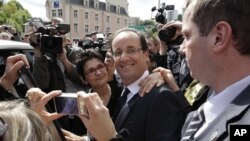Francois Hollande, the former leader of France’s Socialist Party, has been elected president of France, defeating incumbent Nicolas Sarkozy.
Despite being one of France's best known politicians, the 57-year-old Hollande has never held a position in the national government.
Dominique Moisi, senior adviser to the French Institute of International Affairs in Paris, notes that Mr. Hollande has been on the French political scene for more than 30 years, climbing up through the ranks under the last Socialist president, Francois Mitterrand.
“He went to the elite school, the National School of Administration [ENA],” Moisi points out. “Then he served in the Élysée (presidential) Palace under Mitterrand as a junior Cabinet member. Then he became the secretary-general of the Socialist Party [for 11 years] and then he declared himself candidate to the presidential election.”
Former International Monetary Fund chief Dominique Strauss-Kahn had been favored to win the Socialist Party nomination, but a sex scandal knocked him out of the race, opening the way for Mr. Hollande to defeat his remaining rival, Martine Aubry, in a primary election.
Mr. Hollande’s economic policies include raising taxes on the very rich, freezing fuel prices, increasing welfare payments and hiring 60,000 new teachers.
During the presidential campaign, Mr. Hollande’s slogan of “my enemy is the world of finance” raised eyebrows, especially in some European capitals, including London.
Bruno Cautres, an expert on the French election process at the Center for Political Research [Sciences Po] in Paris, says Mr. Hollande made a point of travelling to London to calm fears that he was a radical.
"He wanted to say that 'I am not going to be a Marxist. I am not going to be a crypto [secret] communist. I am not someone who will make nationalization and things like that,'" Cautres said. “So obviously, when he said so, he just wanted to reassure the international financial milieu and markets that you could be a socialist and a pragmatic person, and that France is not going to change.”
Charles Kupchan, a Europe expert at the Council on Foreign Relations in Washington, says Mr. Hollande has another controversial policy.
“He’s called for renegotiating the fiscal pact,” says Kupchan, referring to the economic agreement forged by the European Union to stabilize the euro currency.
“Hollande’s call to reopen that pact, and to focus more on stimulus than austerity, will certainly win him some support in France and in other European countries - notably Italy, Spain, Greece, Portugal - but it could spell trouble with Berlin,” Kupchan adds.
And Kupchan says there are other foreign-policy differences between Mr. Hollande and Mr. Sarkozy: the timing of French troops' withdrawal from from Afghanistan, and Mr. Sarkozy’s decision to bring France back into NATO’s integrated military structure.
“Hollande says, ‘I want French troops out in 2012.' Sarkozy has said 2013. NATO and Washington are saying 2014,” notes Kupchan.
The analyst expects that Mr. Hollande will not try to undo Mr. Sarkozy’s NATO policy, but predicts he will give it a fresh look.
“And that would suggest that there might be a return to a French foreign policy that is somewhat less Atlanticist than it has been under Sarkozy,” Kupchan says. “And Sarkozy is, I would say, the most Atlanticist, pro-American president since World War Two in France.”
Dominique Moisi agrees, saying President Hollande “will look and sound less pro-American than Nicolas Sarkozy. He will look and sound less pro-Israeli than Nicolas Sarkozy."
“But the margin of maneuvering is so slim,," Moisi adds, "that I don’t think there will be major differences between the foreign policy of Hollande and the foreign policy of Nicolas Sarkozy.”
And that also means no great change in relations between Washington and Paris.




